February, of course, is a short month, but with a fair bit of gloomy weather I found ample time for reading, comfortably ensconced on the couch with a cup of tea.
Ample time to read six books, in fact: one taut mystery/thriller, very good; a memoir I’m highly recommending; and four novels I’m also recommending with all my thumbs up. Following are, as usual for these posts, transcriptions of the handwritten entries in my Reading Journal, numbered from the beginning of the year. Transcriptions in italics with the occasional added comment in regular font as well as links to posts on my Instagram books account.
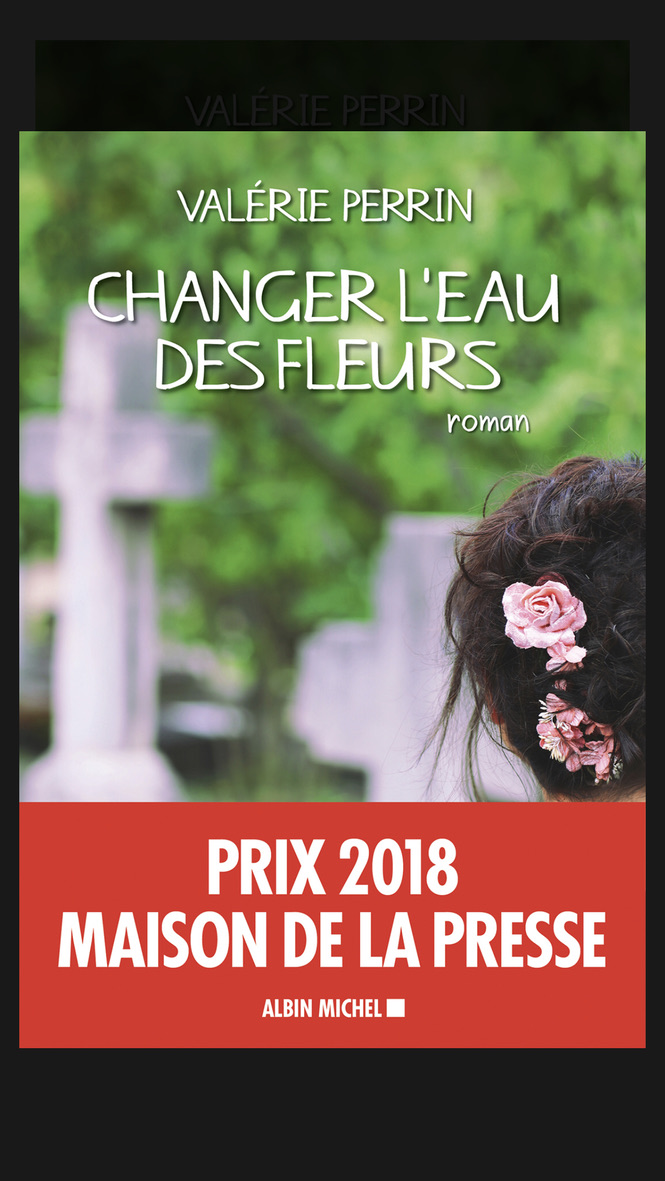
11. Changer l’eau des fleurs, Valérie Perrin. Read in French; Literary fiction; Set in France; Loss and mourning; Death of a child; Marriage; Love; Recovery. Highly recommended.
My sister-in-law told me about this one, published in an English translation as Fresh Water for Flowers (I found out later that she hadn’t read it yet!), and when I learned it had originally been written in French, I bought the e-book as my next French reading project. Such an engaging novel, although the structuring element is very sad, the loss of a young child.
Not surprisingly, then, when she finds her infatuation for a physically beautiful young man is returned — in sexual attention, at least — she makes the relationship work although it soon becomes obvious her (eventual) husband is incapable of emotional generosity. But Violette pours her nurturing and her joy for life, creativity, etc., into raising her daughter, and she even manages small ways to lift them both out of the paucity of their life as train-crossing guardians (she takes on all this work herself, never able to sleep more than 5 or 6 consecutive hours before another train comes through; her husband never willing to cover even one crossing).
Without giving away too much of the story (and the structuring of its many layers, clever and effective, keeping readers impatient to know what’s next but also giving us much to think about each time the forward momentum is paused) Violette makes an important connection, after her daughter’s death, to the cemetery in which the little girl is memorialized. And she finds a way to move there and build a new life. Her husband moves with her at first, but disappears after a year or two . . . and the mystery of how or where or why is an important strand of the narrative. A strand which brings the possibility, at least, of romantic love back into Violette’s life.
Wonderful characters brought together in the unlikely setting of a cemetery. And I’d love auto-didact Violette to meet Renée, the prickly concierge in Muriel Barbery’s The Elegance of the Hedgehog.
Highly recommended, whether you read it in French or English. Let me know what you think!
Instagram post here.
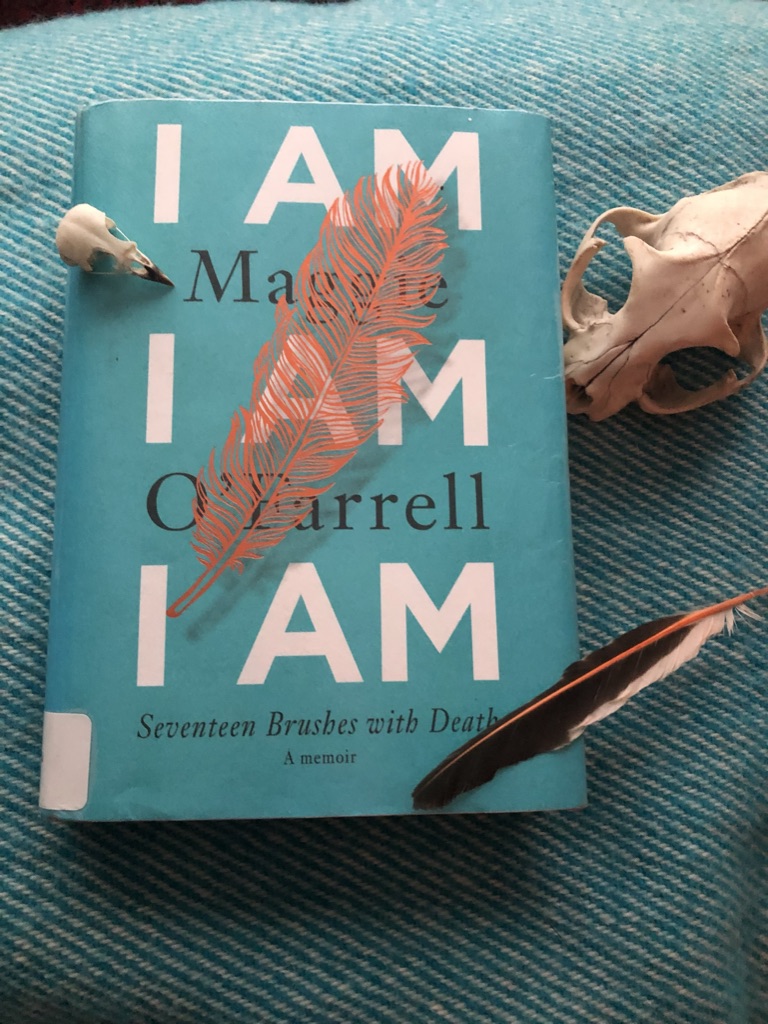
12. I Am, I Am, I Am: Seventeen Brushes with Death, Maggie O’Farrell. Memoir; Mortality; Illness/Disability; Parenting; Women’s Lives.
What an idea for a memoir — telling one’s life, essentially, through one’s experiences at the borders of mortality! Of course, few of us have as many such experiences as O’Farrell has had, nor do many of us have anything like her ability to observe, analyze and articulate these.
I very much appreciated O’Farrell eschewing a chronological ordering of these experiences — instead, she plays at an anatomical approach instead and begins with Neck (1990), skips back to Lungs (1988) before going back to her early childhood (1977) in which she was almost hit by a car as she bolted across the street. Backward and forward and through different body parts until, in the last quarter of the book she arrives at Cerebellum (1980) and we find out more about the crippling illness that O’Farrell was not expected to recover from. She’s referred to its impact and continuing effects throughout the memoir, mostly glancingly, but now she describes it in detail through the eyes, the perceptions, of her eight-year-old self. It is excruciating and it is painfully but valuably instructive.
And it informs the ensuing pages, in which she writes about her daughter’s hyper-sensitivity (allergies) to a wide variety of triggers. The constant pain and discomfort and disability and unwelcome visibility her daughter suffers because of her skin’s reactions to the world she lives in. And the terror her parents live with because of the threat to her respiratory system of anaphylactic shock.
Again, highly recommended although perhaps too difficult for some.
I should add that as difficult as some of the material is, Maggie O’Farrell (whom you will know from her novel Hamnet, or Instructions for a Heat Wave, or The Vanishing Act of Esme Lennox, among others — I’m still working on her backlist) has nonetheless made this an engaging book to read. The structure, pace, and style of her memoir give the reader places to rest, to ponder, to be diverted and entertained — and to admire the way that these “brushes with death” seem to have fortified the writer’s appreciation for life. My Instagram post is here.
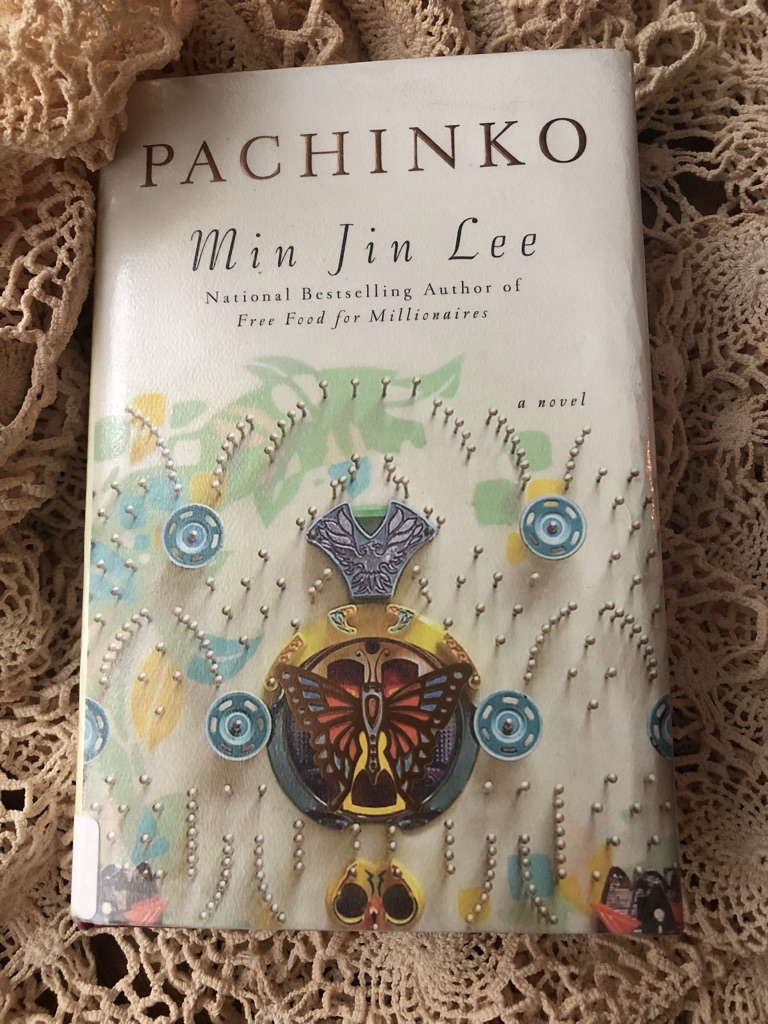
13. Pachinko, Min Jin Lee. Historical fiction; Literary fiction; Generational saga; Korean-American writer; female writer; Korea/Koreans 20th century; Koreans in Japan; Diaspora; Ethnicity; Longing and Belonging; Home/homelessness; Family.
A generational saga tracing the descendants of a Korean couple, young newyleds in the early 20th century, whose only daughter then becomes pregnant (still unmarried) in the early 1930s by a wealthy Korean from Japan. The daughter’s eventual move to Japan exposes her to the Japanese prejudice against Koreans, which becomes even more pronounced as WWII advances.
And even though her children grow up in Japan and the family eventually prospers or at least achieves some material and financial stability, citizenship is out of reach, school entry and employment opportunities limited. Hence the appeal of work in the Pachinko parlours that give the novel its name. These offer Koreans born in Japan the opportunity to provide their children a better life, but they also expose them to connections with a criminal underworld and to more scorn from ethnic Japanese.
Love, romance, family ties, strong women, parent-child relationships, and 20th-century history and politics. Many of you will already have read this, but if not, I’d recommend adding it to your list.
Instagram post here (with comments from other readers who also loved this book)
14. This Is What Happened. Mick Herron. Spy Thriller. Set in London.
I happened to notice that Paul was reading a book by Mick Herron, had picked it up by chance at the library, so serendipity delivered this one to me. It’s not of the Slough House series but a cunning stand-alone that I gulped happily. Spy territory and a young woman hoping to remake her life/luck, risking all for a man who’s working to save the world as it’s known in London, post-Brexit. She agrees to help him. And is almost successful in her (admittedly very naïve) mission. Until all goes Very! Wrong!
This one’s a fast read, very entertaining. . . clever twist. . .
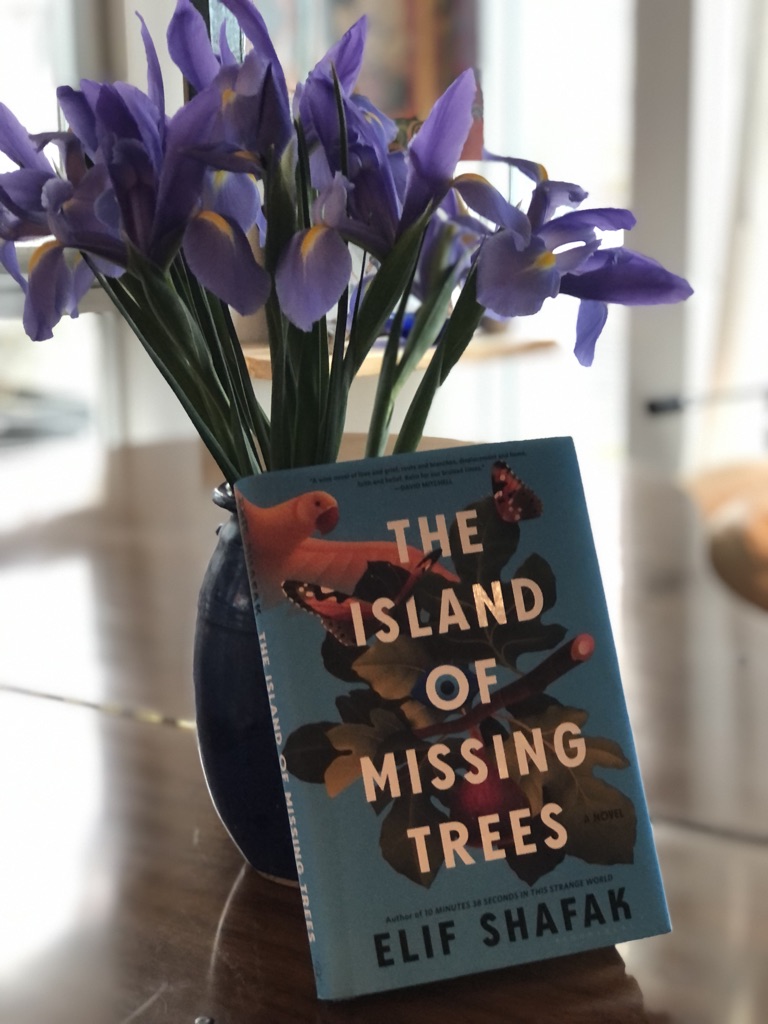
15. The Island of Missing Trees, Elif Shafak. Literary fiction; historical fiction; Cyprus, 20th-century history; ethnic conflict; love across ethnic divisions; depression/suicide; diaspora; expat-life; British immigrants; adolescent girl; eco-criticism.
In England, some months after her mother’s suicide, a 16-year-old shocks herself, her classmates, and her teacher by screaming a scream that goes on and on, unstoppable. She’s torn by reluctance to let her father know what she’s feeling/thinking and her growing need to learn about her background, about the family she never got to know, back in Cyprus.
She pushes both her father — a Greek Cypriot — and her mother’s sister (Turkish Cypriot, hasn’t visited once since the girl’s mother left for England before the girl was born; is only meeting her niece for the first time, months after the loss of sister/mother/wife), pushes them for answers about their past which, she argues, is also hers.
We’re taken by various narrators — including the clone of a very old fig tree, a clone re-rooted in England, buried for safety against winter frosts of the colder climate — through the past of the girl’s parents, their forbidden romance, the young love made impossible by civil war, and then their meeting again years later in the aftermath, the attempted reconciliation.
Bees, birds, numerous plants besides the sentient fig tree broaden the novel’s perspective far beyond the anthropocentric and we see the cost of human culture and conflict on the larger (and smaller) ecosystems. Sorrow, horror, hatred, love, resilience, tenderness, humour — all here. Thoughtfully so, never sentimental or sensational.
Recommended. My Instagram post here. And I’ve posted before about other novels by Elif Shafak: 10 Minutes, 38 Seconds in this Strange World, The Bastard of Istanbul, and Three Daughters of Eve.
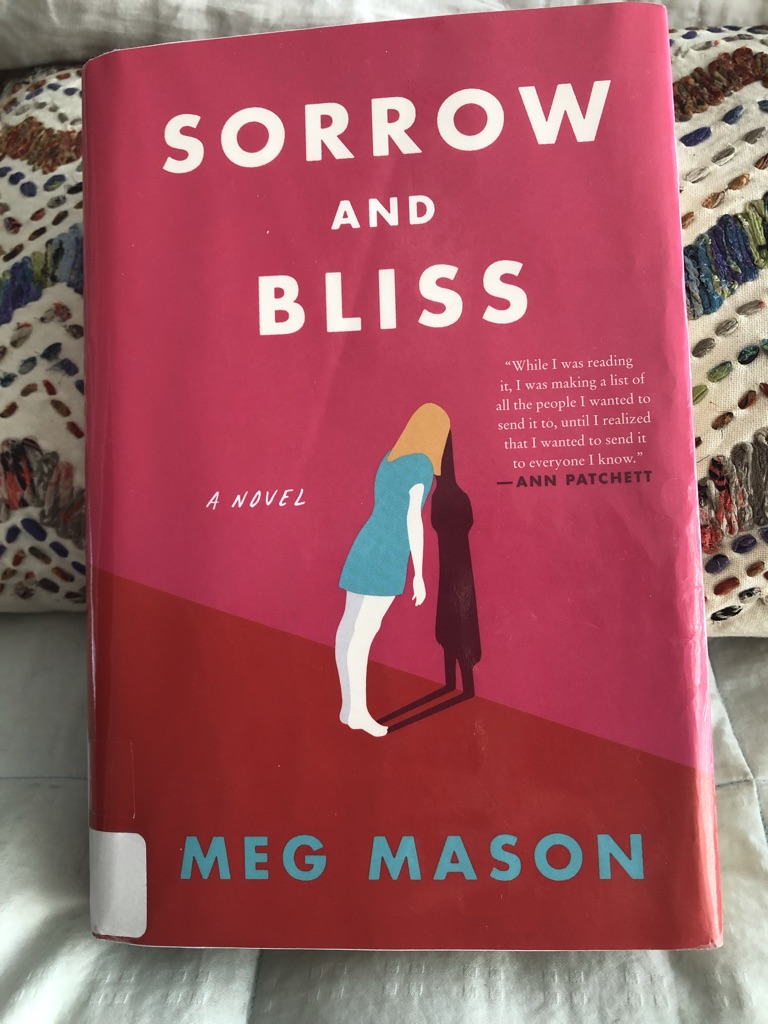
16. Sorrow and Bliss, Meg Mason. Literary fiction; Darkly comic; Comedy of manners; mental illness; marriage; dysfunctional families; sisterhood; parenting; childlessness.
Loved this so much! About marriage and love and dysfunctional families, sisterhood and resilience — but also, because resilience can seem an unrelenting demand these days, mental health/illness and depression and despair and the failure of a medical system to provide adequate support.
Briefly, Martha — bright, talented, funny, but since her late teens susceptible to profoundly bleak periods, under-employed, self-sabotaging. The good in her life seems to be her (second) husband, Patrick. But her life shrinks and his expands, and as good as he is, she will not have a baby with/for him — while her sister has 1, 2, 3 boys and then a little . . . well, no spoilers in these pages. . .
Not sure why I found this novel so relevant — I’m not childless, don’t suffer from debilitating mental illness, and there might be some codependency in my pretty good marriage, but that’s probably just the nature of the beast. But I kept stopping at passages to reread and nod and chuckle at, or just to say “Huh.” Such well-chosen anecdotal illustrations, small observations. I think I have to buy my own copy so that I can read passages aloud to dinner guests. Ha!
Recommended, obviously! Instagram post here.
That’s it for February reading, and I’m rather pleased with my self for getting this post up in the first third of the month following. Probably won’t happen again for a while, but why not celebrate the small achievements, right? I will also celebrate each and every one of your comments here, whether about titles here that you have also read — agree or disagree with my reports or want to expand on them — or titles here you haven’t read yet but are planning to. . . or other titles you’ve read and enjoyed lately and want to recommend. . . or you’ve read and want to warn us away from. . . All literary grist for our conversational mill here (if you’ll excuse the misshapen, overstretched analogy). Comments very welcome and the microphone is now yours.
Ordered Sorrow and Bliss from the library when I saw your IG post and it’s in already. Sounds like the subject matter is right up my street, or up my alley as we say down east. Not sure that I’m ready emotionally to tackle dysfunctional families and childlessness yet. Sisterhood and resiliency I could use though. Going to go find that Mick Herron one, now. A book that Stu and I can both read. Lots to mull over here, as usual. Thanks, Frances. xo
Author
I hope you enjoy both. The difficult material in Sorrow and Bliss is made manageable by such witty observation; it’s darkly comic, but still very funny!
Beautiful books,Frances! I’ve read E. Shafak and Pachinko and loved both. Sorrow and Bliss goes to my list,as well as Mick Herron
I’ve read simultaneously (serendipity!) two books dealing with the memory loss: W.A. Schwab’s The Invisible Life of Addie LaRue (I know that you’ve read it. I started last year but didn’t like the beginning. I’ve tried now and find it beautiful,interesting,thoughtful…so,every book has it’s right moment) and
The Housekeeper and the Professor- who had a special feeling for what he called the”correct miscalculation”,for he believed that mistakes were often as revealing as the right answers-by Yoko Ogawa. Due to Professor’s accident,his memory lasts only 80 minutes. It is beautiful,touching,poignant…..about how we choose our family outside the families (who are all broken in this case)and how feelings grow even when your short-time memory is very limited. How math could stay as the only anchor for the Professor,illustrating the whole worldview. I love math and find this book very beautiful-but,I don’t know nothing about baseball (very important part of the bond and the book,too) and still find it beautiful to read
Toshikazu Kawaguchi’s charming novel Tales From the Cafe: Before the Coffee Gets Cold (the first book was Before the Coffee Gets Cold 1). What if there was a quirky cafe in a small back alley in Tokyo where you could travel in time,but only for a short time,”before the coffee gets cold” (and not being able to change the present)? What if you stayed longer than that and became a ghost? Who would you like to meet? Lost opportunities, unsaid feelings, things one wants to repair….
Hendrik Groen On the Bright Side: The new secret diary of Hendrik Groen
“The circus show was beautiful, sad and merry”. So was the book itself- touching and funny and poignant. I love Hendrik and his life and friends.
Matt Haig’s Midnight Library is connected with different lives and different choices one makes….so,it seems that there were a lot of similarities im my february reading.
I’ve finished Taylor Jenkins Reid’s The Seven Husbands of Evelyn Hugo (and Malibu Rising as well)
I plan to read two very long books in March….we’ll see how they will complement each other
Dottoressa
Author
Such a great addition you’ve brought to the February reading conversation, K! I agree with you about Addie LaRue (which I was surprised to have enjoyed so much; not my usual genre). You make The Housekeeper and the Professor sound like a must-read, so that’s going on my list as well, and I’m tempted by the Café time-travel books, which sound whimsical and intriguing. (I really liked Midnight Library, again a bit surprised at that).
Curious to know what the two very long books are. I’ve just got a copy of Anthony Doerr’s latest (Rhiannon told me I should; I obeyed) and it’s pretty big, but not sure I’ll start it this month. . .
So may interesting suggestions, the pile around my bed continues to grow. I read 4 books over the past month. One was the nearly 700 page Something to Hide, the long anticipated Elizabeth George Inspector Lynley novel. As always George, who is American, deals not just with who done it murder but with social issues in the UK. This time it is female genital mutilation, or FGM, outlawed in the country but still practiced underground in London by the Nigerian and Somali community. a detective trying to stop this practice is found dead. the usual characters are all here, less of Lynley in this novel. For book club we read Alexander Pushkin’s story The Queen of Spades. I confess I had not read anything by him previously and grateful for the global book club to expand my horizons. and I confess as well to reading a James Patterson novel. this was The Horsewoman. As a horselover and owner I had to scratch the itch. also a long time friend has a daughter, who I have loved since she was 5 actually rides in these high level competitions described in the book. the last book I read was What could Be Saved by Liese O’Halloran Schwartz. I had never heard of the book or the author. I kind of grabbed it from the display of new fiction as I was checking out, just in case I ran out of something to read. I almost returned it without even starting it. so glad I did. It is both a mystery and family saga. It moves from Bangkok, Thailand in the early 1970’s to present day Washington DC. A missing child is found alive. is it the long lost brother, and what happened to him in the intervening years? but it is mostly about relations between parents and children, between siblings, couples. secrets are revealed over the course of the novel, as it shifts between timelines. I never found the switching difficult to follow, and it is well written. I would highly recommend.
Author
I’ve just finished that (very big!) Inspector Lynley novel. Yours is a good review; it’s always hard to sketch out a mystery without giving too much away!
I’ll confess to not having read Pushkin either. A global book club would be a treat!
I’ve just looked up What Could be Saved — suspect this would be perfect for getting me through a long flight next month — thanks for the recommendation.
I’ve been madly downloading ebooks/audiobooks on my tablet for my two week sojourn across the Pond–leaving on Sunday. Plenty of reading/listening time during flights and train rides. Just added Sorrow and Bliss. So thanks for the recommendation. Also downloaded Confessions of a Bookseller written by the evidently acerbic owner of a fairly famous bookstore in Wigtown, Scotland. Won’t be visiting that particular bookstore, but plan to hit plenty more in London, as well as The Toppings in Edinburgh. Extra folding bag packed. The carry-on is fine for my clothing, but won’t accommodate extra books. 🙂
Recently read ‘Yours Cheerfully’ by A.J. Pearce–a sequel to Dear Mrs Bird (evidently more to come as these two come under the grouping of The Emmy Lake Chronicles–name of the main character who becomes a reporter for a British women’s magazine). WWII fiction. Not a heavy read, though it does reflect on the hardships faced by UK working women, particularly those in factories, during the war–those with children who faced a lack of childcare, 12 hour working days (making it hard to queue up at places for limited food), or things like not receiving military husband’s income if he was reported missing–his wages were stopped. Interesting for me, as my British mother simultaneously held three jobs throughout the war, including driving an ambulance in London, but at least she did not have to worry about caring for children at the time.
Author
Hmm, I have Confessions of a Bookseller on my For Later list at the local library website — you’ll have to let me know what you think, whether I should move it up or not.
Amused to hear that someone besides myself spends as much time preparing books for a trip as packing clothes.
by the time you read this, you may already be across the water. Bon voyage!
Just gobbled up “Still Life” by Sarah Winman, recommended either by you, Frances, or Sue Burpee, in a previously enjoyed blog. (Thank you both for your wonderful book recommendations, so greatly appreciated and enjoyed). I have read about “prescription” reading, I think it has been called, where one reads a book that addresses exactly what one needs to be addressed. It can shed light on dilemmas or just comfort the reader. I think “Still Life” was just the kind of book I needed to read now, set comfortably back in the last century, delighting in the beauty and art of Italy, and providing mostly happy closure for all the characters. I look forward to reading this author again.
Author
I loved Still Life and recommended it enthusiastically last month. Such an inclusive vision of possibilities for lives well lived, not without adversity but with resilience and fortitude and love and creativity. Plus Florence!!
Yes, I thoroughly devoured ‘Sorrow and Bliss.’ Meg Mason is such an observant author.
My only other reading recommendation from last month is an oldie (but a goodie!), ‘The Hope Circuit’ Martin Seligman.
Thanks for your excellent reviews, Frances. I think I may be ever slowly inching towards reading properly again!
Author
Such a good book, isn’t it? And yes, she’s an observant writer, so insightful.
I didn’t know about The Hope Circuit, and given that my word for the year is “hope,” this memoir is going on my list right away. Thank you! (and glad to know you’re getting your reading mojo back!)
Thank you, Frances!